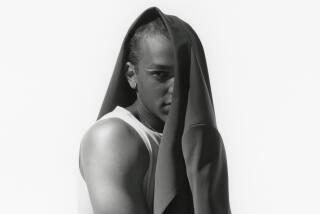âDress-Up Thursdaysâ Would Suit Retailers Just Fine
Memo to men who love dressing casually at work: Donât get too used to those comfy khakis and polo shirts. Their days may be numbered.
Thanks to some concerned members of the menswear industry, come September we will see a push for a new workplace dress code phenomenon: Dress-Up Thursday.
You can thank Vincent Rua, president of the Dress-Up Thursday campaign and a menswear retailer, for this counter to âcasual Friday.â After seeing sales of tailored suits flatten or decline, and hearing about workers guilty of heinous fashion crimes while taking advantage of casual dress codes, Rua decided something had to be done.
âCorporate America is not really happy with the effects that dressing casually have had,â says Rua, president and chief executive of the New York-based Christopherâs Menâs Stores Inc. âI do want to make it clear that Dress-Up Thursday is not about wearing suits to work every day--there are times when a sport coat is fine or dressing casually is fine. But in most business situations, wrinkled khakis and sandals donât work. This is an evolutionary process. Weâre starting with one day a week, asking corporations to try a slightly different dress code. Letâs see what happens to office decorum, and let the corporation decide.â
The campaign already has the backing of some leading menswear manufacturers, including Hartmarx (an umbrella corporation for more than 30 companies, including Hart Schaffner & Marx, Hickey-Freeman, Kenneth Cole and Palm Beach) as well as Arnold Brant, Quentin Ashford, Profile Menswear and Neema Clothing. After garnering support from manufacturers and retailers, Rua says the next phase will be sending out detailed dressing guides to corporations across the country.
The industry is pinning huge hopes on young men, who are already showing a growing interest in dressing up. With their trend-setting influence, this generation could give a huge boost to tailored clothing.
âThe campaign is certainly an attempt to bring the workplace to where it should be,â says John Carroll, owner of Carroll & Co., an upscale menswear store in Beverly Hills. âWhat Iâm hearing from my customers is that workers are not deciphering the difference between being at home and being at work. I think the original thought was that people would be more casual, and maybe thatâs OK in a dot-com or more creative business, but if weâre talking about attorneys or accountants, I just donât think itâs proper. I hear grumblings from people, theyâre paying an attorney $300, $400 an hour, they donât want to see him dressed in khakis and a polo shirt.â
*
A shift toward neater, more tailored apparel may already be taking place. Witness Regis Philbinâs wardrobe on âWho Wants to Be a Millionaire.â Those dark tone-on-tone suits, shirts and ties were such an astonishing overnight success that Philbin launched his own dress-shirt label with Van Heusen.
âThat color-on-color dressing has had an effect on dress shirts, a positive effect,â says Ken Duane, president of Phillips-Van Heusenâs Izod division. But he sees the popularity of the Regis look as part of another wave: âThe modern dressing phenomenon,â which has spawned other variations in dress shirts, including color, microfibers and rayon blends, pleats and pocket treatments.
âItâs not about T-shirts or even knit shirts,â he says. âModern dressing is dressy.â
Derrill Osborn, director of menâs clothing for the Dallas-based Neiman Marcus stores, points out that even Bill Gates, unofficial mascot of Americaâs cyber corporations, has been trading his usual ultra-casual look for a more tailored style, sporting jackets and ties in television appearances.
âWeâve seen him more frequently in a coat and tie lately,â Osborn notes. âHeâs certainly been in the courtroom a lot, but maybe heâs aspiring to be different himself. Whatâs coming out of all of this is that weâre learning that one outfit canât get us through every occasion in life, whether itâs a polo match or a funeral or a barbecue.â
Osborn is also encouraged by men in their 20s who are suiting up: âOn Saturdays at the store I see a lot of young men trying on suits. Theyâre wearing them to work, but being more masterful about them--they can mix and match them to death, like women have learned to work a little black dress. Thatâs gratifying. Theyâre tired of looking like slobs.â
Thereâs no denying that wanting a better-dressed work force is part of whatâs driving this Dress-Up Thursday campaign, but itâs not the only reason.
Sales of suits are not what they used to be before business casual started becoming a way of life some 10 years ago. While retailers and manufacturers say they havenât pushed the panic button, no downturn is a good downturn, even if sales in areas such as sport coats, dress slacks and general sportswear are up.
At Hartmarx, company Chairman and Chief Executive Bert Hand says that suit sales at his company have declined, from 10 million-12 million units five years ago to about 9 million expected for this year.
âIt doesnât bother me,â he says. âI know that the sport coat business is going to grow, thatâs happening now. How it will all settle out I canât predict, but I expect the mix will be different. On the other hand, all of this has caused us to go into other businesses, such as golfwear.â
The companyâs Kenneth Cole division, aimed at young men, has also proved a winner; Hand says sales have gone from $3 million to $30 million in two years, with a younger demographic buying up these forward-yet-tailored suits and tailored looks.
The secret to the lineâs success, says Hand, is that 20-something guys simply donât want to look like their rumpled, dressed-down fathers.
Hartmarx has its own print ad and Web site campaign planned for the fall, something that Hand calls ânot so much about pushing suits but pushing the notion of dressing appropriatelyâ for social and business occasions.
But not all employees may be thrilled at the prospect of ditching their casual duds and going back to wearing a suit--or even a sport coat.
*
At the 91-year-old Los Angeles law firm Loeb and Loeb, managing partner Lance Jurich believes the companyâs new five-day-a-week business casual dress code has made for some happy lawyers.
âItâs really helped,â he says of the policy begun three months ago. âI think people, when they donât have ties around their necks, tend to feel a little better. Itâs really improved morale around here. The dot-coms sell the casual wardrobe, and that is sometimes who we are competing against for top talent. But I still think some people are sneaking in wearing suits, pretending they have court hearings, because their business casual wardrobe isnât up to speed yet.â
âIf things are going pretty well for a company, then you say, âIf it ainât broke, why fix it?â â says Rua. âMaybe the companies are not doing as well as they could be. Everything is cyclical. I have to be honest--if we did nothing and waited till the next major recession, this would take care of itself. But why wait?
âI think itâs an evolutionary process,â he adds. âWhether 5% or 10% or 15% of corporate America tries it, I canât predict. But it will take off. I have many friends in high places across America and a lot of them are champing at the bit for an opportunity to try something.â
*
Jeannine Stein can be reached at [email protected].






